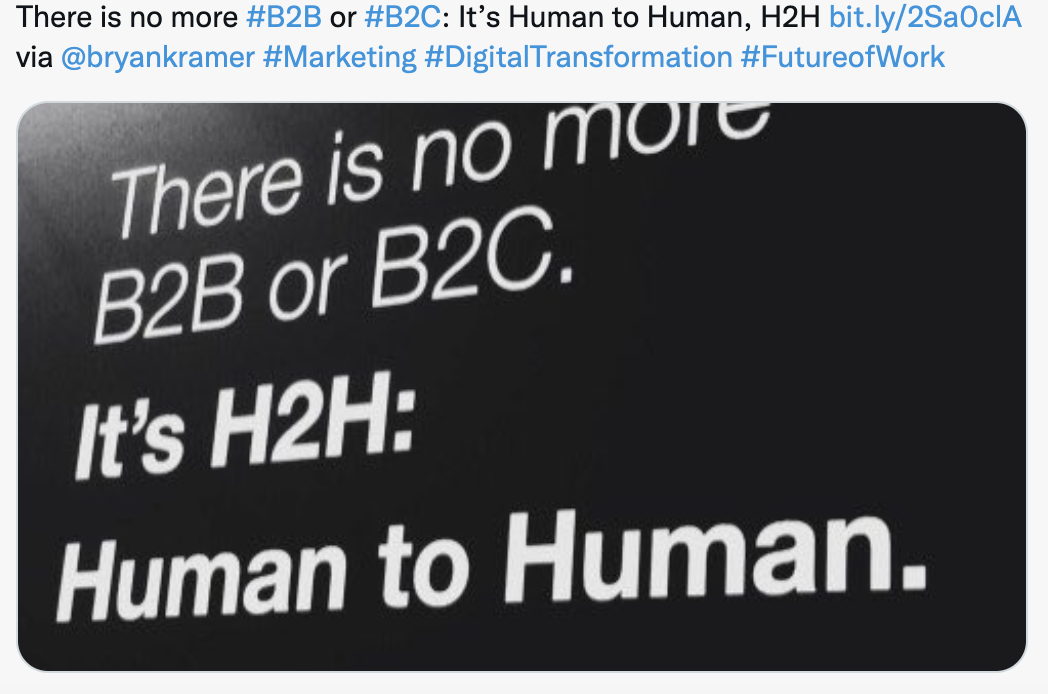“The future of Digital Marketing is a combination of digital AND human. Brands should be present everywhere and relevant while consumers are looking for information or interacting online (at their time, in the form they prefer) It’s also about patience: it will take longer to build relationships. But we’ll better understand customers and have better results over time.”
— Bryan Kramer
Voices In Personalization (VIP) is a thought leadership spotlight series where we feature digital marketing personalization experts’ POV on industry and technology trends, insights, and advice for the digital and e-commerce marketing community. In this post, I spoke with human-to-human (H2H) expert, Bryan Kramer, who shared insights into humanizing marketing, personalizing customer touchpoints, building employee-centric companies, and the future of digital marketing.
- Tell us about yourself.
I’m a business strategist, keynote speaker, executive and business mentor, investor, 3x CEO, 2x bestselling author, Forbes columnist, married to the love of my life, and dad to the best two kids on this planet. CEO of H2H Companies and Co-Owner of PureMatter, a Silicon Valley marketing agency since 2001. I sparked the Human-to-Human H2H global movement that set out to humanize business through simpler communication, empathy, and celebrating our imperfections. My TED Talk on the subject in 2014 featured a TED first – allowing mobile devices during the event to share the experience that trended internationally. I have since spoken over 200 times including Mastercard, Loreal, Nasa, GoDaddy, Harvard, Charles Schwab, SXSW, NFL, Verizon, and Hawaii Lodging & Tourism.
- Why should marketers become more human in their approach?
The world is in a state of change and technology is advancing faster than ever before, creating new types of relationships. There are now many sources to get information: TV ads, billboards, radio but also social media, automation, artificial intelligence, bots, augmented reality, and more to come. The marketer’s challenge is to create relevant personalized content for consumers. So one has to develop a real relationship with the consumer.
- Increasingly, brand marketers are using technologies to personalize digital ads and marketing content. Are they doing enough to create the human-to-human connection digitally?
Digital is a powerful way to connect with the consumer. It’s also very efficient in terms of cost and time. However, marketing via social media for instance needs human interaction: thinking about content, exploring ideas, etc. It cannot be done automatically! We must think about the consumer as the main character in every brand’s story, even in digital ads. And stories come to life through the experiences people have when they interact with that brand. Brands must first recognize that consumers are now part of their story. We need to work to combine human and digital touchpoints at the same time!
- You talk about “family first” companies. What does that mean and how can this help brands?
Family first means that the whole company is focused on its clients (family members) and not purely on profits. It is a way to change the corporate culture into humanized, employee-centered organizations. This involves changing and adapting corporate values, processes, HR policies as well as the way we treat our suppliers, etc. Humanizing companies can in turn humanize people, which is the beginning of social change.
- Marketing leaders are dealing with “burnt out” staff and challenges in hiring. How can they best lead their organizations in the current environment?
Humanization is the best way to help people in any organization. They need to have clear and simple goals and make them relevant for everyone (people like stories!). The boss/ leader must become a culture coach, helping employees find meaning, values in what they do.
There is also a limit on how long you can ask your staff to work under pressure. So as a leader I would be thinking of ways to improve the resilience and happiness of my employees, organization-wide. Also, I would cultivate an environment where people can thrive in different settings.
- How important is personalized customer experience when it comes to marketing strategy?
It’s vital. A personalized experience is the ultimate goal, to deliver relevant content and messages for each client at the right time. The problem is that it is not easy to achieve: what works for one customer may not work for another. So we need more research and development in personalization technologies and techniques. The other challenge is that marketing departments are not set up to process and manage all the data they currently have. We need to integrate and analyze collected data from various sources (both internal and external) in order to understand customers better. This will enable us to customize their experiences with our brands: content, products, services, and so on.
- What’s your take on the future of digital marketing?
The future of Digital Marketing is a combination of digital AND human. Brands should be present everywhere and relevant while consumers are looking for information or interacting online (at their time, in the form they prefer). It’s also about patience: it will take longer to build relationships. But we’ll better understand customers and have better results over time.
Digital marketing will also become both the facilitator and catalyst in terms of social change. The technology is developing fast, allowing us to get closer to consumers. We can now integrate their values and wishes into our strategies and campaigns. This is a new way for companies to see customers as partners!

